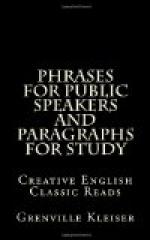From “On the Privilege and Duties of Patriotism.”
* * * * *
For myself, I believe that whatever estrangements may have existed in the past, or may linger among us now, are born of ignorance and will be dispelled by knowledge. I believe that of our forty-five States there are no two who, if they could meet in the familiarity of the intercourse, in the fulness of personal knowledge, would not only cease to entertain any bitterness, or alienation, or distrust, but each would utter to the other the words of the Jewish daughter, in that most exquisite of idylls which has come down to us almost from the beginning of time:
“Entreat me not to leave thee, or to return from following after thee; for whither thou guest, I will go; and where thou lodgest, I will lodge; thy people shall be my people, and thy God my God.
“Where thou diest, will I die, and there will I be buried; the Lord do so to me, and more also, if aught but death part me and thee.” George Frisbie Hoar.
From “Address at the Banquet of the New England Society.”
* * * * *
He knew full well and displayed in his many splendid speeches and addresses that one unerring purpose of freedom and of union ran through her whole history; that there was no accident in it all; that all the generations, from the Mayflower down, marched to one measure and followed one flag; that all the struggles, all the self-sacrifice, all the prayers and the tears, all the fear of God, all the soul-trials, all the yearnings for national life, of more than two centuries, had contributed to make the country that he served and loved. He, too, preached, in season and out of season, the gospel of Nationality. Joseph Hodges Choate.
From “Oration on Rufus Choate.”
* * * * *
I leave these fellows and turn for a moment to their victims. And I would here, without any reference to my own case, earnestly implore that sympathy with political sufferers should not be merely telescopic in its character, “distance lending enchantment to the view”; and that when your statesmen sentimentalize upon, and your journalists denounce, far-away tyrannies—the horrors of Neapolitan dungeons—the abridgment of personal freedom in continental countries—the exercise of arbitrary power by irresponsible authority in other lands—they would turn their eyes homeward and examine the treatment and the sufferings of their own political prisoners. I would in all sincerity suggest that humane and well-meaning men who exert themselves for the remission of the death-penalty as a mercy would rather implore that the doom of solitary and silent captivity should be remitted to the more merciful doom of an immediate relief from suffering by immediate execution—the opportunity of an immediate appeal from man’s cruelty to God’s justice. Stephen Joseph Meany.




